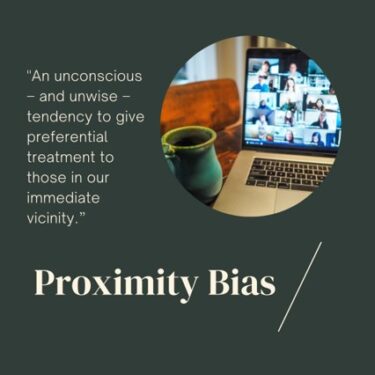Have you heard of proximity bias? It’s a by-product of Remote working. What is proximity bias? The BBC describes it as “an unconscious – and unwise – tendency to give preferential treatment to those in our immediate vicinity.”
This is problematic.
Hybrid or remote workers join video calls with their office-based colleagues. Often, they see the “in-jokes” and references from the corridor that their office-based colleagues brought into the room. Homeworkers can’t see all the social cues; they simply cannot read the body language of the on-screen heads and shoulders.
The quality of meetings and decisions suffer due to proximity bias. Organisations are having to innovate their way out of the pandemic, and this means there’s a lot of brainstorming and decision-making. Leaders tend to use the immediately available resources. It’s quicker. The time and effort to schedule in a meeting with remote workers can be seen as a chore and delay. As a result, the expertise of the remote worker is not used. It’s a corporate case of “out of sight, out of mind”. It gets worse. Research shows that we look more favourably on those whom we see more often.
Employees with close physical proximity to their team and company leaders can be perceived as better workers and ultimately find more success in the workplace than their remote counterparts. Yet, remote working can release talent. Research shows that introverts can thrive since remote work offers an opportunity for the ‘quiet deliverers’ who flew under the radar in a hectic office a chance to really stand out and deliver.
Leaders miss the invisible factors that facilitate the building of trust that are fostered by working in the same location. Leaders need to ensure remote workers are included as part of the workforce and remain on track for promotions. Leaders need to understand the unique thinking capability of their people so that they can maximise their talent and delegate effectiveness. Failure to address proximity bias will limit organisations. Companies will lose their top talent when isolated remote workers leave to join more inclusive employers.
Proximity bias should be a major concern for companies that implement hybrid work environments. Solutions are needed. Please leave a comment. How do you think we can eliminate proximity bias?



0 Comments